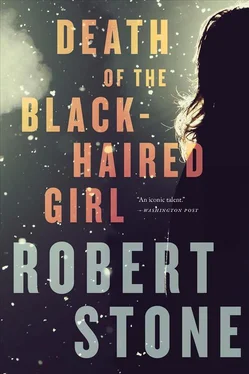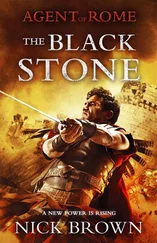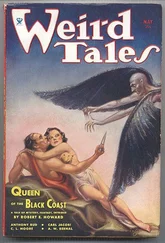At first Stack could not believe it. Then, although he knew perfectly well what he had been told in the captain’s soft professional tone, he kept thinking that the thing announced had been his own death. He had absorbed his wife’s death by feeling that it had transported him into a kind of post-life of his own in which he was as close to her as to any of the living. Dying was frequently on his mind. He had the city’s health care benefits but as a rule he did not go to doctors. Stack simply assumed that his emphysema and the damage he had done to himself by years of alcoholism were bills about to come due. It might be slightly premature — he was under seventy — but where he came from it was considered respectable in men. Now he tried to tell himself that he had been given notice. But Maud had no connection in his mind with death at all; her problems came from her insistent pursuit of living. Of the more abundant life her intelligence, her beauty and diligence, her courage, could win for her. During one of their constant arguments in past years she shouted at him:
“I have to live more of a life! I have to live inside a bigger circle than you and Mom did.”
Trying to understand what he had been told, Stack was presented with a puzzle. Going off to the college, she had stepped out to the big circle. They rarely spoke after she moved up to Amesbury. When she came home to visit, she talked down to him. He beset her with cautions that he himself knew were clichés. So in that sense she was gone, lost to him. The other side of this was that she was a living part of him, someone who was so much of his mind and body that he could no more lose her and live than he could lose his heart.
In the gathering shock he felt his arms go numb. “My arms,” he said aloud. When he sat down, the sensation went away but, holding his forearms in front of his eyes, it was impossible for him not to imagine his way back to the nights when his wife was working and Maud was a baby and he had carried her back and forth against his shoulder in the same room where he now sat, more or less dying. He would not let her do it, he thought. He stood up to run away, lurched back and forth in the room, swinging at phantoms, throwing elbow punches to free his arms of her. That was no good — it just brought back the memories and took his breath away and there was nowhere on planet Earth to run.
After the captain’s visit, in terror of grief, to save his life, to humiliate himself, to undo time and death, to make a fool of himself unworthy of burning, he went out and bought a bottle to replace the one Maud had stolen. He thought he could catch fire more slowly with the whiskey but it made him violently sick in the downstairs bathroom. Then he drank more of it and was better.
Prompted by the whiskey, he fled up the stairs and stood for a few minutes at the door of Maud’s room. Finally he could not enter, so he went to his own room and removed his Glock from a locked drawer and put in the clip. How stupid, he thought, to keep a weapon in your house unloaded. However, he knew why it was unloaded and not ready to hand as it should have been. He took the Glock downstairs with him. He had forgotten to go slowly on the stairs. Panting, he sat down again and poured more liquor. It was a waste, eight years of sobriety, but there was no way to put the stuff back in the bottle.
He stared at it, at the label. Jameson, the Catholic whiskey, as opposed to Bushmills, the Protestant. Some indeterminate rage had come over him, preferable to the pain. It was them, Catholics. Us. No, he thought. Them. They — them — had been many things over his lifetime — lawyers, perpetrators, judges, anyone they called mokes, civilians, the public in general, anyone who was not in the job. They had come to include just about the whole world now — the people who wrote the newspapers, the people you read about in the newspapers, the people who wrote letters to newspapers, the readers of newspapers. And television and its hypnotized witnesses. He had warned her about them and what would happen with the article. He had warned her they would hurt her. And she had become one of a different department of them, an anti-them, same thing, he thought, nutso fucks. He had tried to save her. But he himself was one of them because he was a drunk, a red-nosed clown, a fool.
And his own parents. And their parents. Them. His teetotaler bartender father with the holy pledge to Matt Talbot, and his mother with her scented novena cards. Them. We ourselves. Too long sacrifice, yes. And we, they, quite probably, had destroyed Maud, the very people who begat the people who begat her. Finished ourselves off, our family, finished my rash young daughter and me. Too long sacrifice, to be sure. Burned our own house as always, in the name of ghosts.
God, he thought, she was right about all the pussy-faced bishops and slobbering priests. Maud had been right. She might just have broken our spell. He took out the gun’s clip, looked at it and snapped it back in. Though it continue the cycle.
He woke, sick and breathless, the next afternoon feeling that grief, rage, alcohol and insomnia were likely to make short work of him, and soon. Then he thought with true terror of the grief that awaited him, the years of it he would have to endure. A grief that sooner or later would infest his heart and burn him down. All his love turned to scarring, a craze. Her childhood blotted out.
Downstairs, he drank ice water from the refrigerator until it eased his thirst and somehow steadied his heart. He still had the Glock semi-automatic he ought not to be in possession of. He had always thought of using a weapon against himself if the worst came. It would be nothing but shameful panic to turn it on himself so. He had seen, he thought, enough of that. It also occurred to him that it would be wrong to make so sudden and violent an end of Maud’s memory, leaving no truly loving trace of her within the length of a day — girl gone, mother, father gone. It was not right. As to religious scruples, he had none. He drank more water and then had another swallow of the whiskey.
But as he had learned before, there were things to be done, and one of them was to call the members of his family. The best person he could think of to handle it was his older sister Gerry, who had done it before. Gerry lived in Florida and passed the time there hating her wealthy ex-husband.
“Don’t cry on me,” he told her at first. He needed a tough cookie to pass the word.
He also called a former police surgeon named Sorkin, a friend of a friend, who would not give him barbiturates but called in a prescription for Ambien. The Ambien worked well enough for him to handle a call the next day from Gerry’s despised ex, Charlie Kinsella, a dapper and much-feared former policeman. Stack feared Charlie as much as anyone and was not pleased to hear that Kinsella promised to drop by later in the day.
“Aw, God, Eddie,” Charlie said when he came. He took Stack in his arms, affording him a whiff of his cologne. “I’m so sorry.”
Charlie had his hair cut in a place that actors went to. He looked like an actor who might play an Irish cop on television and in fact had provided filmmakers with constabulary advice until even the most rash and reckless of the aspiring moguls had become afraid of him. Stack watched his former brother-in-law enter his living room with princely condescension. Stack thought he might actually be waiting to be shown a seat.
“Have a seat, Charlie.”
Kinsella took off his overcoat in a way Stack thought showed every facet of the Harris weave. He had no idea what such an overcoat might cost. A thousand dollars? Five thousand dollars? More? The dark suit he wore was most impressive.
Charlie Kinsella took Stack’s best chair, carefully removing the past week’s newspapers from it, including a copy of the Gazette. He rested his resplendent overcoat over an adjoining rocking chair, leaving the sofa to Stack, and looked around the room.
Читать дальше












